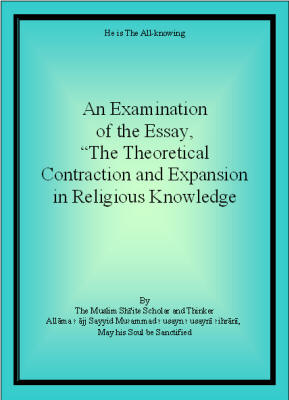
Human sciences, however highly advanced, are restricted and may not undermine one’s devotedness.
Subject of the Book : A Critique of Dr. Surūsh’s Theory as to How Religious Understanding Change
■ What is science of religion?
■ What are the bases of these sciences?
■ How are religious sciences and knowledge related to other sciences?
■ Does religion disprove technology and industry?
■ Are experimental sciences ultimately to the benefit of humanity?
■ Where is the eternal Science?
■ What are these types of articles aiming at?
In this volume, his holiness Ayatollah Allama Tihrānī, may his soul be sanctified, has brought up and duly responded to ten of the major objections raised in Dr. ‘Abd al-Karīm Sorūsh’s The Theoretical Contraction and Expansion of Religious Law against the authority and eternality of the Qur’an and all sanctities and realities of the world.
Due to its importance and as per suggestion by some scholars for easy access by professors, students, and researchers, this book, which is the major part of the second volume of Angelic Light of the Qur’an, has been published separately and without any alterations to be forwarded to the seekers of the path to the Truth and Peace.
The author’s ten objections to the article:
1. Words are devised for the semantic spirits rather than for referents and instances, so understanding phrases and statements in the Qur’an and traditions are not dependant on the outcomes of experimental sciences.
2. Theology is based on demonstration and experimental sciences are based on induction, so change in empirical theories does not cause change in demonstrations.
3. The hypothesis of the writer of the article is not practically applicable, hence nothing more than a fantasy.
4. Misconceptions brought up by the writer concerning the situation of religious thought have originated from the impacts of deviation in Christianity on the communities.
5. In order to prove his hypothesis, the writer has employed some totally wrong considerations and evidences.
6. Scientific jurisdiction of religion encompasses the Realm of Being, whereas that of the experimental sciences is encircled by matter; thus, experience can not be a comprehensive interpreter of religion and be pivotal in religious comprehension.
7. The criterion for true or false understanding is its being demonstrative; therefore, non-demonstrative understanding would be nothing more that conjecture or delusion and rationally unreliable.
8. Man’s reliance is on intellect, and the intellect does not ruin its certitude with a conjecture or probability.
9. The soundness of the preliminaries of a sound demonstration is based on the intellect independent of the acquired and experiential science; so, it does not change with the change of experiential theories.
10. Hypotheses and theories are not epistemologically valuable unless they are rendered demonstrative.
Persian & Arabic full text